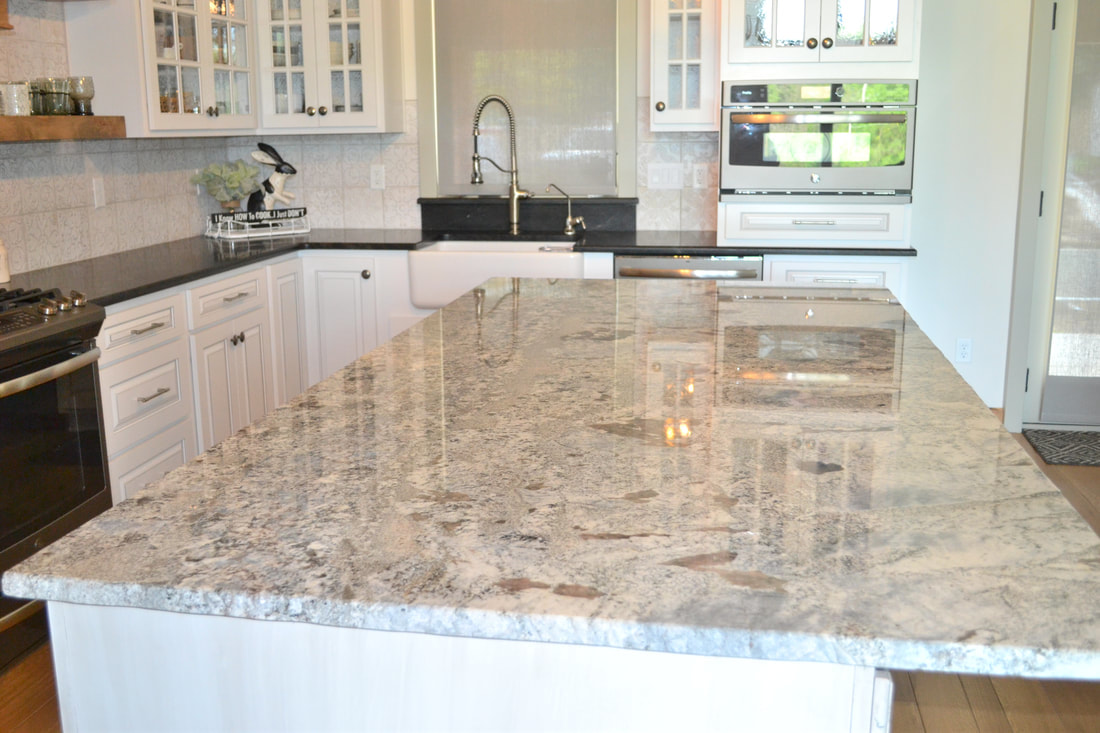Why is My Granite Dull & Faded?

It’s normal for granite countertops to eventually become dull or appear faded. Don’t worry, your countertop’s surface can be restored to its original shine.
How Does Granite Become Dull?
A lot of granite goes through a polishing process during manufacturing. This adds a natural shine to the stone. Over time substances can build up on the stone’s surface. For example, hard water deposits, food debris, calcium deposits, grease and soap residue can build up on the surface over the course of years, and you probably won’t notice. This build up causes the stone to deflect light rather than reflect it, which makes the countertop appear less shiny. In many cases the granite looks dull or cloudy. So, granite countertops don’t exactly fade or change in tone, they are often coated with substances that make the surface appear dull. Technically, the shine is still in there.
Another important note: if your granite countertops are sealed, you should expect for this sealer to wear down over time. While a dull countertop looks bad, the breaking down of the sealer can allow damage to the stone. When the seal is no longer effective, the stone can be penetrated by substances that can cause stains or etching. How long your sealant will last depends on how often your countertops are used, how much abuse they take, and the quality of the sealer. Generally you should expect to reseal your granite every couple of years. If you see stains and what look like water rings or discolorations on your stone, the seal may be bad.
Solutions for Dull Granite Countertops
Dull granite can easily be restored through several methods. First, you should consider the age of the countertop and how well you’ve kept it clean. For minor dulling, you can probably do the repair yourself. For stones that haven’t been well maintained or cleaned regularly, or for granite that has severe stains and damage such as etching, you may want to hire an expert.
If you only have minor dullness, you might be able to restore your granite’s shine yourself with some off-the-shelf products. Make sure to check your warranty and your stone manufacturer’s guidelines before attempting this process on your own.
Remove Residue and Soap Film from Countertop
There are a number of granite-safe soap film removers you can purchase that can restore some of your stone’s shine. Make sure to use a pH neutral product that is safe for granite. These products do a good job covering small and large areas, but only for minor dullness related to hard water and soap deposits.
For small areas that are more difficult, many people use a razor blade to lightly scrape, flatly, across the stone. You should see the residue come off the stone right away when you scrape. Then use a super fine steel wool to sand the area. This method often works well around sinks and cooktops where residue build up is more common.
After scraping away the residue and cleaning the stone with water, you can use a polishing powder to restore the shine. These polishing products are safe for most stone. You will need to reseal the stone after completing this process.
Another option for small areas is Stone Scrub or Acetone to remove residue. These are slightly abrasive liquid products that can be applied by hand or with a variable speed polisher/buffer. You will need to polish reseal your stone after using this product.
For large areas, you may want to try one of the above methods to clean problem areas, then use a granite polishing powder to restore the entire countertop, rather than just the small area. This will give you a uniform finish with a like-new shine. You will likely want to use a variable speed buffer for this. You’ll simply work the dry powder into the stone, covering the entire countertop. This process will remove minor scratches and stains and help restore the stone’s natural shine.
Polish and Reseal Granite Countertops
There are several polishing compounds on the market that are effective. Make sure you select one for your stone’s specific color, and again ensure it is okay to use the product on your countertop by referring to your manufacturer’s guidelines. After buffing or polishing with a compound, you will need to reseal the granite.
While some people polish and reseal their granite on their own, Quality Granite and Marble advises calling a professional. If you live in the Wichita area, call us to ensure your granite restoration is done correctly.
If your countertops are damaged, badly dulled, if they’ve never been thoroughly cleaned or if they have etching, a professional can completely refinish and reseal the granite.
Call Quality Granite and Marble today at 316-946-0530 for granite restoration.


